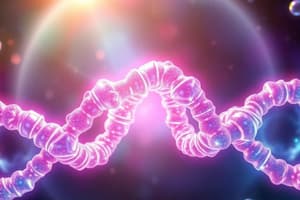Podcast
Questions and Answers
What distinguishes coenzymes from normal substrates in enzymatic reactions?
What distinguishes coenzymes from normal substrates in enzymatic reactions?
- Coenzymes perform catalysis independently of the enzymes.
- Coenzymes can be synthesized by the enzymes that use them.
- Coenzymes are always derived from proteins.
- Coenzymes are sourced from vitamins and used by various enzymes. (correct)
Which process directly converts light energy into chemical-bond energy?
Which process directly converts light energy into chemical-bond energy?
- Fermentation
- Cellular respiration
- Oxidative phosphorylation
- Photosynthesis (correct)
In what manner can enzymes convert energy from ATP?
In what manner can enzymes convert energy from ATP?
- They do not utilize ATP for any processes.
- They use it to directly create new ATP.
- They transform it into mechanical energy and transport energy. (correct)
- They can convert it into thermal energy only.
What is a critical characteristic of enzymes in biochemical reactions?
What is a critical characteristic of enzymes in biochemical reactions?
Which of the following statements about enzymes is not true?
Which of the following statements about enzymes is not true?
What is the primary reason enzymes are effective catalysts?
What is the primary reason enzymes are effective catalysts?
Which statement about the catalytic power of enzymes is correct?
Which statement about the catalytic power of enzymes is correct?
What common requirement do many enzymes have for functioning?
What common requirement do many enzymes have for functioning?
Which of the following statements best describes the role of enzymes in chemical reactions?
Which of the following statements best describes the role of enzymes in chemical reactions?
What distinguishes ribozymes from typical enzymes?
What distinguishes ribozymes from typical enzymes?
Which of the following is NOT a characteristic of enzymes?
Which of the following is NOT a characteristic of enzymes?
How do enzymes contribute to energy transformation in biological systems?
How do enzymes contribute to energy transformation in biological systems?
Which property of enzymes allows them to bind substrates effectively?
Which property of enzymes allows them to bind substrates effectively?
What is the primary purpose of the enzyme nomenclature system established?
What is the primary purpose of the enzyme nomenclature system established?
Which group does Nucleoside monophosphate (NMP) kinase belong to?
Which group does Nucleoside monophosphate (NMP) kinase belong to?
What is the enzyme designation for NMP kinase?
What is the enzyme designation for NMP kinase?
What term is used to describe an enzyme that lacks its cofactor?
What term is used to describe an enzyme that lacks its cofactor?
Which of the following statements about cofactors is true?
Which of the following statements about cofactors is true?
What is the relationship between an apoenzyme and a holoenzyme?
What is the relationship between an apoenzyme and a holoenzyme?
Which group of cofactors is typically derived from vitamins?
Which group of cofactors is typically derived from vitamins?
What is a prosthetic group in the context of coenzymes?
What is a prosthetic group in the context of coenzymes?
What is the primary function of carbonic anhydrase in the body?
What is the primary function of carbonic anhydrase in the body?
Which enzyme is described as being quite specific, acting only on the carboxyl side of certain residues?
Which enzyme is described as being quite specific, acting only on the carboxyl side of certain residues?
What characteristic differentiates enzymes like papain from trypsin?
What characteristic differentiates enzymes like papain from trypsin?
What is the significance of the suffix 'ase' in enzyme names?
What is the significance of the suffix 'ase' in enzyme names?
How does the reaction rate of carbonic anhydrase compare to an uncatalyzed reaction?
How does the reaction rate of carbonic anhydrase compare to an uncatalyzed reaction?
Which of the following enzymes is known for its ability to hydrolyze specific peptide sequences?
Which of the following enzymes is known for its ability to hydrolyze specific peptide sequences?
What is the reason enzymes display a high degree of specificity?
What is the reason enzymes display a high degree of specificity?
Which of the following statements is true about all enzymes?
Which of the following statements is true about all enzymes?
Flashcards are hidden until you start studying
Study Notes
Enzymes: Core Concepts & Kinetics
- Enzymes are powerful biological catalysts that enhance and control chemical reaction rates dramatically.
- Most enzymes are proteins, enabling specific binding with a wide range of molecules.
- Enzymes accelerate reactions by factors exceeding a billion times and are crucial for reactions that would otherwise occur slowly.
- Example: Carbonic anhydrase hydrates 10^6 molecules of CO2 per second, catalyzing reactions 10^7 times faster than in the absence of the enzyme.
Specificity of Enzymes
- Enzymes exhibit high specificity for the reactions they catalyze and the substrates they bind.
- Proteases, for example, hydrolyze peptide bonds, demonstrating specificity in enzyme activity.
- Various proteolytic enzymes differ in specificity:
- Papain: Non-discriminating, cleaves any peptide bond.
- Trypsin: Specific for peptide bonds adjacent to Lysine and Arginine residues.
- Thrombin: Highly specific for Arg-Gly bonds in particular sequences.
Enzyme Classification and Nomenclature
- Enzyme names often bear little resemblance to their function; many are named after substrates with the suffix "-ase."
- Enzyme classification uses a systematic approach with a four-number code preceded by "EC."
- Key groups in enzyme classification include transferases, hydrolases, and others based on the type of reaction catalyzed.
Cofactors in Enzyme Activity
- Many enzymes require cofactors for activity, which can be metals or coenzymes (small organic molecules).
- An "apoenzyme" is an inactive enzyme without its cofactor, while a "holoenzyme" is the active form, including the cofactor.
- Cofactors can be:
- Tightly bound coenzymes (prosthetic groups) that remain unchanged during reactions.
- Loosely associated coenzymes that act like co-substrates.
Energy Transformation by Enzymes
- Enzymes play a crucial role in energy conversion in biochemical reactions, such as in photosynthesis and cellular respiration.
- Photosynthesis transforms light energy into chemical-bond energy.
- Cellular respiration converts free energy in small molecules into ATP, employing enzymes for efficient energy conversion.
Summary Points
- Enzymes are primarily protein-based with significant catalytic power and specificity.
- They enhance reaction rates dramatically and often require cofactors for complete activity.
- Enzymes transform energy efficiently and can be identified through their systematic nomenclature.
Studying That Suits You
Use AI to generate personalized quizzes and flashcards to suit your learning preferences.




